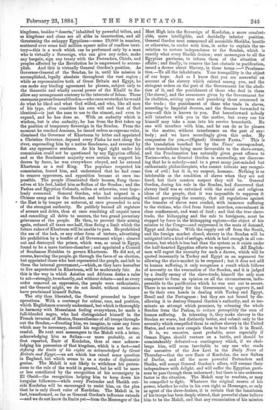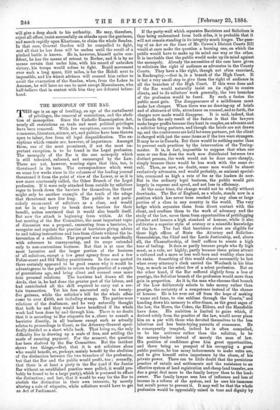GENERAL GORDON IN KHARTOUM.
E have said enough elsewhere of General Gordon's
V V extraordinary personality ; but it is necessary to con- sider resolutely and quietly, as we should consider any other political incident, what he is now doing as British Agent in Khartoum. The country, though suddenly and powerfully interested in the General, scarcely yet realises either the mag- nitude of the task he has undertaken, or the extent—the exceptional extent—of the powers with which he has been invested. General Gordon was not sent to relieve Khartoum, or to bring away its garrison, but as agent of two Govern- ments, the British and the Egyptian, to restore the tribes of the Soudan to independence, on condition of their sending the Egyptian garrisons back to Egypt in peace. As the Soudan is not a province, but an Empire covering five considerable kingdoms, besides "deserts," inhabited by powerful tribes, and as kingdoms and clans are all alike in insurrection, and all threatening the unhappy Egyptians—some 29,000 in number, scattered over some half million square miles of roadless terri- tory—this is a work which can be performed only by a man who is virtually a Sovereign, who can give any order, make any bargain, sign any treaty with the Pretenders, Chiefs, and peoples affected by the Revolution he is empowered to accom- plish. And this is virtually General Gordon's position. As Governor-General of the 'Soudan, he is, until his mission is accomplished, legally absolute throughout the vast region ; while as representative both of Great Britain and Egypt, he can make any binding agreement he pleases, subject only to the theoretic and wholly unreal power of the Khalif to dis- allow any arrangement contrary to the interests of Islam. These enormous powers General Gordon—who once wrote that he would do what he liked and what God willed, and who, like all men of his type, often considers his own will and that of God identical—is just the man to use to the utmost, and even to expand, and he has done so. With an audacity which is wisdom, but is also audacity, he has from the first taken up the position of temporary Sovereign in the Soudan. From the moment he reached Assonan, he issued orders as supreme ruler, dismissed the Governor of Khartoum by letter and appointed a Christian Governor, deposed every Pasha he met along the river, superseding him by a native Soudanese, and reversed by fiat any oppressive sentence. As his legal right under his commission could not be questioned by any Egyptian official, and as the Soudanese majority were certain to support his decree by force, he was everywhere obeyed, and he entered Khartoum as a real King. The populace respected his commission, feared him, and understood that he had come to remove oppressors, and opposition became at once im- possible. The people illuminated their houses, flung them- selves at his feet, hailed him as Sultan of the Soudan ; and the Pashas and Egyptian Colonels, sullen or otherwise, were hope- lessly overawed. General Gordon, who had reigned in a Chinese camp and in the Soudan, and besides understanding • the East is by temper an autocrat, at once proceeded to acts of the strongest authority. He publicly burned all registers of arrears and debts, thus at once remitting all unpaid taxes and cancelling all debts to usurers, the two grand pecuniary grievances of the people. He then, to prevent their arising again, reduced all taxes one-half, thus fixing a limit which the future rulers of Khartoum will be unable to pass. He prohibited the use of the lash, or any other form of torture, advertising his prohibition by a bonfire of all Government whips ; cleared out and destroyed the prison, which was, as usual in Egypt, found to be a mere torture-chamber ; and appointed a Council of Soudanese Notables to govern Khartoum. He did not, of course, knowing the people, go through the farce of an election, but appointed those who best represented the people, and left to them the internal government,—which, as they have hereafter to live unprotected in Khartoum, will be moderately fair. As this is the way in which Asiatics and Africans desire a ruler to act—strongly, trenchantly, and without debate—and as every order removed an oppression, the people were enthusiastic, and the General might, we do not doubt, without resistance have proclaimed himself Sultan.
The city thus liberated, the General proceeded to larger operations. With a contempt for colour, race, and position, which Englishmen scarcely understand, but which is thoroughly in harmony with Mussulman feeling everywhere, he made a full-blooded negro, who had distinguished himself in the French invasion of Mexico, Generalissimo of all troops through- out the Soudan,—directing him, we imagine, to raise any force which may be necessary, should his negotiations not be suc- cessful. He next sent messengers to the Mahdi with a letter, acknowledging him as Sultan—or more probably, as at first reported, Emir of Kordofan, thus at once acknow- ledging his possession of that kingdom, which is a fact--and de:fining the limits of his rights as acknowledged by Great Britain and Egypt,—an act which has raised some question in England, but which seems to us a stroke of diplomatic genius. The Mahdi is not likely to withdraw his preten- sions to the rule of the world in general, but he will be more or less conciliated by the recognition of his sovereignty in El Obeid—the recognition helping him to keep down his irregular followers—while every Pretender and. Sheikh out- side Kordofan will be encouraged to resist him, on the plea that he is only direct ruler of Kordofan. The Mahdi is, in fact, transformed, so far as General Gordon's influence extends —and we do not know its limits yet—from the Messenger of the Most High into the Sovereign of Kordofan, a more comfort- able, more intelligible, and decidedly inferior position. General Gordon next summoned all accessible Sheikhs, hostile or otherwise, to confer with him, in order to explain the re- solution to restore independence to the Soudan, which is exactly what every Sheikh desires ; sent messengers to all the Egyptian garrisons, to inform them of the situation of affairs ; and finally, to remove the last obstacle to pacification, issued a decree about Slavery, in these terms :--" Proclama- tion.—To all the inhabitants. Your tranquillity is the object of our hope. And as I know that you are sorrowful on account of the slavery which existed among you, and the stringent orders on the part of the Government for the aboli- tion of it, and the punishment of those who deal in them [the slaves], and the assurances given by the Government for its abolition, seizing upon and punishing those concerned in the trade ; the punishment of those who trade in slaves, according to Imperial decrees, and the firmans forwarded to you—all this is known to you. But henceforward nobody will interfere with you in the matter, but every one for himself may take a man into his service henceforth. No one will interfere with him, and he can do as he pleases in the matter, without interference on the part of any body ; and we have accordingly given this order. My compassion for you.—(Signed) GORDON PASHA." This is the translation vouched for by the Times' correspondent, other translations being more favourable to the slave-owner, and the Proclamation has naturally given great offence to Tories—who, as General Gordon is succeeding, are discover- ing that he is nobody—and to a great many just-minded but enthusiastic philanthropists, who cannot tolerate any recogni- tion of evil ; but it is, we suspect, humane. Nothing is so intolerable as the condition of slaves when they are not freed, but their masters suspect they will be. General Gordon, during his rule in the Soudan, had discovered that slavery itself was so entwined with the social and religions ideas of the people, that it was impossible to suppress it without governing the country, that all regulations against the transfer of slaves were evaded, with immense suffering to the victims, who died from forced marches, concealment in close confinement, and want of food ; and that the true slave- trade, the kidnapping and the sale to foreigners, must be stopped by force in the kidnapping regions—the object of his mission to the Congo—and suppressed in the seats of demand, Egypt and Arabia. With the supply cut off from the South, and the foreign market closed, slavery in the Soudan will be mitigated into a kind of serfage, which is bad enough in all con- science, but which is less bad than the system as it exists under the half-hearted Egyptian efforts to suppress it. All English- men will regret the necessity for such a decree, which will be quoted incessantly in Turkey and Egypt as an argument for allowing the slave-market to be reopened; but it does not add to human suffering, it only recognises a result which follows of necessity on the evacuation of the Soudan, and it is judged by a deadly enemy of the slave-trade, himself the only man competent to form an opinion on all the circumstances, indis- pensable to the pacification which he was sent out to secure. There is no necessity for the Government to approve it, and so tie their own hands in dealing with Turkey and Egypt, Brazil and the Portuguese ; but they are not bound by dis- allowing it to destroy General Gordon's authority, and so ter- minate an attempt which promises, by releasing the whole Soudan from the Pashas, to reduce perceptibly the sum of human suffering. In tolerating it, they make slavery in the Soudan no worse, but distinctly better, and submit only to the necessity which compelled them to endure slavery in the United States, and even now compels them to bear with it in Brazil.
It is, we conceive, most probable, more especially if Osman Digna should venture on a battle, and should be unmistakeably defeated—a contingency which, if we chal- lenge him, will seem inevitable to any one who reads the narrative of the Jew Levi in the Daily News of Thursday—that the new Emir of Kordofan, the new Salton of Darfur, and all the more powerful Pretenders and Sheiks, will accept General Gordon's offers, will resume their independence with delight, and will suffer the Egyptian garri- sons to pass through them unharmed ; but there is one unknown factor in the situation. The Mahdi may be resolute, or may be compelled to fight. Whatever the original source of his power, whether he rules in his own right as Messenger, or only as agent of the slave-dealers, it is certain that the fanaticism of his troops has been deeply stirred, that powerful clans believe him to be the Mahdi, and that any renunciation of his mission will give a deep shock to his authority. He may, therefore, reject all offers, insist successfully on attacks upon the garrisons, and march rapidly upon Khartoum, to claim the whole Soudan. lir that case, General Gordon will be compelled to fight, and all that he has done will be useless until the result of a pitched battle is known. He is, however, himself quite con- fident, he has the means of retreat to Berber, and it is by no means certain that under him, with his record of unbroken victory, his troops would refuse to fight. Rapid movement over such a long space, 250 miles, is for the Mahdi next to impossible, and his wisest advisers will counsel him rather to await the evacuation of the Soudan, when, from the Lakes to Assonan, he will have no one to meet except Mussulmans, who half-believe that in contest with him they are defeated before- hand.




































 Previous page
Previous page